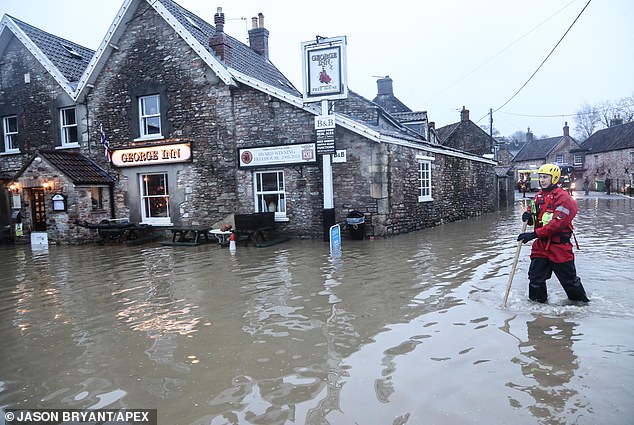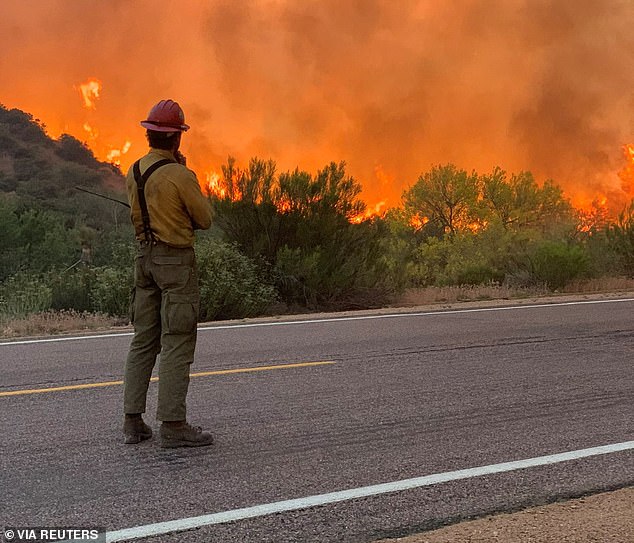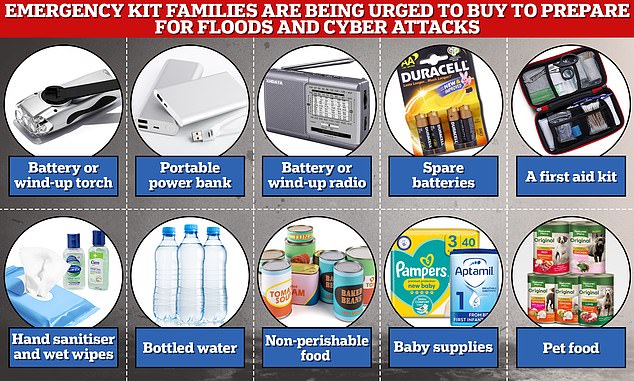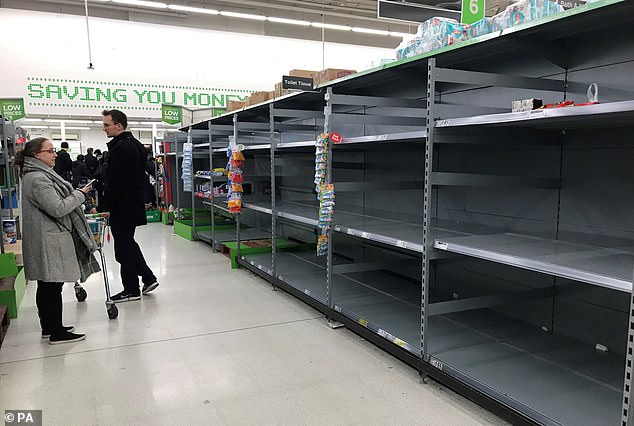Preparing for the end of the world? Here’s what scientists say you REALLY need – as ministers urge Brits to launch national ’emergency packages’
Britons have been urged to ‘prepare for an emergency’ by stockpiling supplies in case they are unable to leave their homes.
On a new government website, a ‘household emergency plan’ reveals a list of ’emergency essentials’ such as bottled water, wet wipes and non-perishable food.
But scientists say the list is missing some key items that could help survive in the event of floods, fires, a new health pandemic or even nuclear war.
Robert Handfield, a professor of supply chain management at North Carolina State University, said households could also use a gas generator.
This can be used as a backup power source for homes during power outages, such as in the event of severe weather.
On a new government website, a ‘household emergency plan’ reveals a list of ’emergency essentials’ such as bottled water, wet wipes and non-perishable food. But scientists say some key items are missing from the list
Gas-powered generators use a gas combustion engine, which means users must use natural gas or liquid propane as fuel.
‘We are subject to severe storms and floods, and electricity is a fundamental need,’ Professor Handfield told MailOnline.
Another item that might come in handy is a chainsaw – although not for self-defense in the event of a societal collapse, as you might initially think.
“Some people often carry a chainsaw if you’re in an area with a lot of trees,” Professor Handfield added.
“If they fall on your house, it’s important to get them off.”
In the event of a pandemic or a scenario that requires protection from smoke, he recommends an N95 face mask, which is better at filtering airborne particles than surgical masks or cloth face coverings.
Less hopefully, Professor Alan Robock, a climatologist at Rutgers University, said that if nuclear war breaks out, “nothing can be done to prepare for it.”
“The only solution is to rid the world of nuclear weapons,” he told MailOnline.

According to scientists, the list of essential items that the government needs in case of an emergency is missing some important items that could promote survival, such as flooding. Pictured is a flooded pub earlier this year in Croscombe, Somerset

Catastrophic events can leave people trapped in their homes. Pictured: A wildfire in Maricopa County, Arizona, May 19, 2024
The new government websiteprepare.campaign.gov.uk, aims to ensure people are aware of the risks in their environment so they can plan appropriately.
The website links to a printable ‘household emergency plan’ that includes a list of ’emergency supplies’ such as bottled water, a wind-up torch, wet wipes, non-perishable food, a first aid kit and spare batteries.
One of the most notable omissions from the government’s list was toilet paper, possibly to avoid another shortage like we saw during the Covid era, although wet wipes could be a more versatile alternative.
However, Brits are being urged not to panic buy such items, which could lead to shelves becoming quickly empty as caused by Covid four years ago.
Ben Kerrane, a consumer behavior expert at Manchester Metropolitan University, was one of about 20 academics who helped the government compile the list.
‘People need to start collecting things slowly and incrementally, if they can,’ he told MailOnline.

A new government website features a ‘household emergency plan’ with a list of ’emergency supplies’ such as bottled water, wet wipes and non-perishable food

Empty shelves where toilet rolls are usually stored in an Asda store in Clapham Junction, London, March 7, 2020
The government also advises people to ‘consider what supplies you and your household may need during an emergency lasting several days’.
The initiative was led by Deputy Prime Minister Oliver Dowden, who was inspired by similar preparations in countries such as Finland.
The Scandinavian country expects households to be able to cope with situations in which “society services are disrupted or even stopped” for 72 hours.
Finns are encouraged to stock up on food and water and be prepared to ‘shelter indoors’ by patching holes in windows and ‘waiting quietly for instructions’ on the radio.
Mr Dowden has previously introduced an ’emergency alert system’, which will allow authorities to activate an alarm on millions of mobile phones to inform people of a potential crisis.
